A light in the dark
3 national treasure comedians talk shop as Moontower Comedy Festival takes to the Austin stage
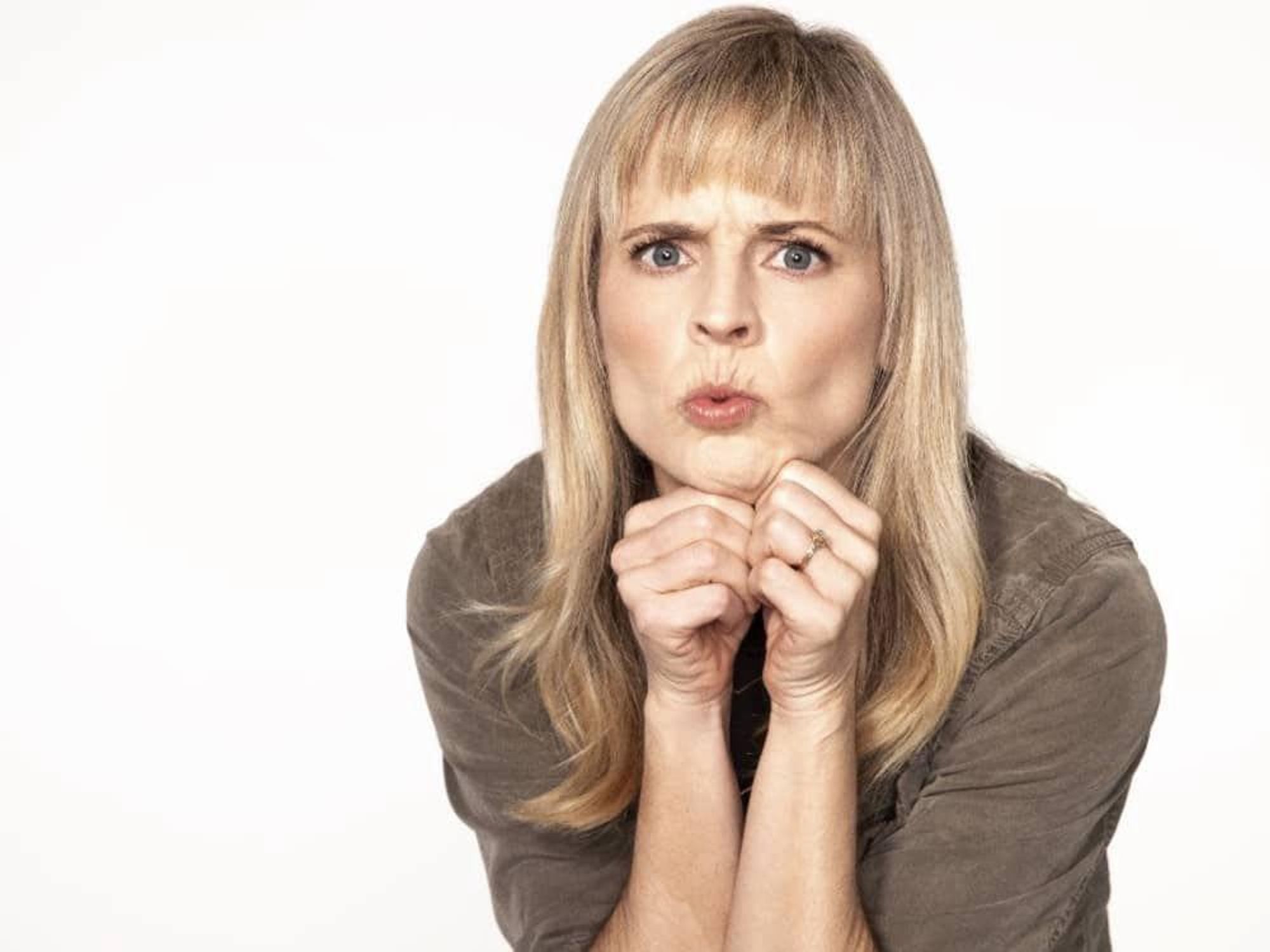
The Moontower Comedy Festival this week is bringing more than 100 comedians to Austin, many for their first live shows since the pandemic shuttered venues. CultureMap extended a warm welcome to three of our favorite comics in the lineup for chats about comedy philosophies, support from family, and confusing fashion choices. The festival runs Wednesday, September 22 through Saturday, September 25, with shows taking place at the Paramount Theatre, as well as other venues around town. Get badges and see standalone ticket options at austintheatre.org.
Margaret Cho
Friday, September 24, 9:30 pm
This Korean American comedian rounds out her edgy, punk-rock essence with thoughtfulness and a commitment to art, from music to fashion. Margaret Cho’s 1994 TV series, All-American Girl, was the first network sitcom in the United States centered around an Asian cast.
CultureMap: You’ve called yourself an outsider before. How do outsiders connect with each other?
Margaret Cho: I think you have to be on the outside to understand what comedy is, because comedy is generally the unexpected thoughts. That’s what laughter is; it’s like a miniature surprise. Comedians are great at this because they live outside of the idea of society. I think that’s why most comedians generally are immigrants. It’s something that is an outsider or a working-class art form.
CM: Your mother said it would be better if you died than went into comedy. Did she eventually get past her prejudice?
MC: She’s very interested in it. Korea, even though it has a long comedy tradition, doesn’t have stand-up comedy. We have a lot of sketch comedy and a lot of something that would be like a pantomime of the British equivalent of satire. My parents never really got it either. They’re still wondering what it is, but they also love show business. They love that I’m an actor. They love being part of my shows and productions.
CM: Have you tried to pursue a Korean comedy career?
MC: I’ve actually done sketch comedy in Korea in Saturday Night Live. They have Saturday Night Live there. It’s very Korean American but we do the sketches in Korean, which is really interesting and cool. It’s hard. I speak Korean, and I’m getting more and more fluent, but it’s still very much a stretch. I definitely need help [writing jokes in Korean] and also, that’s part of the joke too ... getting things wrong in translation.
CM: What does musical comedy give you that stand-up can’t?
MC: The music for me is often about working with other artists. I’ve worked extensively with David Garza, who’s a wonderful Austin singer-songwriter. Now he’s moved to LA. I’ve written a lot in Austin, oddly, with Patty Griffin and with David, and played at South By Southwest. There’s something very long-lasting about musical comedy, maybe because it takes a long time to make. There’s something really regenerative about it.
CM: In one of your shows, you showed your tattoos and said, “My body is not a joke.” When you’re getting a new tattoo, do you have a sense of humor about it?
MC: I’m pretty serious. It’s also really a way for me to connect. Again, tattoos also are a collaborative process because you’re working with another artist who’s working on your body. You’ve got to love somebody who’s covered in your blood. It’s kind of like giving birth because you’re creating something new and it causes a lot of pain and you have to live with it forever. There’s a sense of euphoria because your endorphins kick in, and then after awhile your body figures out it’s actually an elective procedure. Your body gets tattoo fatigue.
CM: What about comedy fatigue?
MC: I think that your job is to push through that. If there’s something that’s really important, it needs to be talked about. We’ve had a long break from stand-up comedy too, so anybody who was sort of, like, burnt out of stand-up comedy has just been able to start up again. I think the Moontower Festival will probably be the one place where a lot of comedians are just starting up again. It’s been nice to do this reset and take time away with the whole world. I think that people going to see comedy will be really excited because there’s so much to say. There’s so much to confront now.
CM: Is there anything you really like talking about with Austinites?
MC: It’s a very youthful, beautiful city that’s full of art and culture that is so different from Texas at large. Everybody’s legs are really tan, but not their ankles. It’s a boot-and-short combination, which to me doesn’t make any sense. But that’s Austin. I remember one time I was there [during] South By Southwest when it was really cold. I think it was a weird winter front that came in 2012 or something. And hipsters didn’t know what to do because American Apparel didn’t make a jacket. There’s something funny about how it’s full of Old Texas but [also] New Texas. So many contradictions that sort of match the boots-and-shorts combination.
Maria Bamford
Thursday, September 23, 9:30 pm
Friday, September 24, 7 pm
If you ask comedy lovers, America’s sweetheart is a woman from Duluth, Minnesota, who breaks into erratic impersonations and post-verbal expressions of dread onstage. Maria Bamford applies her sunny personality to advocating for more accessible mental-health care.
CM: Someone on YouTube called you “the jazz music of comedy.” What do you think that means?
Maria Bamford: If I’m going to take that as a compliment — and I think I should — I think it means it’s a small, dying audience. Very specific. You have to go out of your way for it. Not everyone will be into it when you put it on. Maybe — at least this is a hopeful deal — 20 years after the death of a jazz comic there’s going to be a lot of talk.
CM: Is it a lot of pressure to be so open about your personal life?
MB: If I am in amongst the jazz of comedy, not many people are trying to find me. It’s that, “Well, you know, she’s at the Albany Funny Bone, but we live 30 miles out. I don’t know if we can make it tonight.” I totally relate. I mean, despite my love of Journey, have I ever seen Journey in a stadium, or anywhere? Have I even looked into seeing Journey live? I have not.
CM: You’re a lot of comedians’ favorite comedian. Do you have a favorite?
MB: It’s usually whoever I’ve just seen. That is where I feel inspired: They’re doing it! To keep doing something, whatever it is, whether parenting your children — high-fives to all the parents out there. I do not have children and there’s a reason for that — it’s amazing. I go to open mics and people who are just starting have far more passion about the craft than I do. It can be very inspiring to see an 18-year-old young man who is high as a kite, but really excited to perform.
CM: Your mom is mentioned throughout your work, in person and impersonation. What was it like to have that kind of comedic rapport with her?
MB: My mom passed away this year, but she was really supportive. It’s painful to have one do a direct impersonation of you to your face. And that’s what I did, from the age of about 13. I’ve had people do impersonations of me to my face and I’m like, [in a rattling breath], “Oh no. ...” Even if it’s spot on, it is harrowing. I love my mom so much. I hope that my impersonation becomes me, that I become her. It’s already happening. I have a little bit of a lip quiver. I really hope it’s a slow bleed into the impersonation because she really knew how to live a good life.
CM: You talk about how bad mental-health care can be. What has made you so able to ask for help when you’ve needed it?
MB: It hasn’t been easy. I am No. 1: wealthy, No. 2: in the entertainment industry. And I have full insurance through a union. I have the dream version of healthcare and mental-health care, and it’s been surprisingly and hilariously difficult to get it. And then, of course, there’s the constant horror stories. Not only can it be expensive, it can be traumatic. I just want to lower the bar for asking for mental-health care. Ask anybody. Ask the barista who’s wiping something down, “Could you give me any ideas?” For real, I have done this. I’ve called local businesses just to see human beings to help you raise your endorphin levels and, I don’t know, give a shoulder-based hug.
CM: On the other side, what’s some of the best mental-health care you’ve received?
MB: I went to a free clinic at the GLBTQ+ center when I first moved to LA, and I got a free, wonderful session with a master’s degree student in training. And she was so freaked out by my situation — I was about to live in my car. She said, “Oh my God, what are you going to do?” And it was at that moment I was like, I know what I’m going to do. It was a moment of human connection. I do like my psychiatrist and my two OCD therapists. I love my insurance that took care of the two hospitalizations. I’ve gotten help Googling whatever it is my symptoms are, [and using] the International OCD Foundation website, the [Depression and Bipolar Support Alliance, and] NAMI, and 12-step groups. I’ve had plenty of wonderful, wonderful experiences, but the bad ones are so funny.
Bob the Drag Queen
Friday, September 24, 11:59 pm
The season 8 winner of RuPaul’s Drag Race is known as one of the show’s wittiest comedians, and is always ready to bounce off another queen in one of many spinoff series. Miss Bob won’t be caught holding back a hot take or an on-the-fly read.
CM: Why do you think you have such great chemistry with people, especially other queens?
Bob the Drag Queen: I’m really open and honest, and there’s very little artifice with me. I’m not really good at social niceties. What you end up getting is just a really authentic experience. Maybe that’s it.
CM: And you also love getting into debates. Did you learn that at school?
BTDQ: I love discussing ideas and ideologies and hearing people’s thoughts. I’m always willing to be persuaded. I really did it at home, to be honest, more so than at school. I’ve always wanted to challenge thinking and challenge my own thinking. My mom will tell you that.
CM: In your case, your actual mother, not a drag mother, introduced you to drag. Did you always think you’d try it?
BTDQ: Yeah, my real-life birth mother who raised me owned a drag club growing up. I had not even considered it. I was kind of afraid of drag queens when I was younger. RuPaul’s Drag Race really got me into the idea of doing drag. One of my mom’s friends got shot by a drag queen when I was younger and he told me drag queens were really scary and dangerous. And that was my idea, frankly, for a really long time.
CM: Do you specifically set aside time to talk about the causes you’re working on?
BTDQ: The activism comes naturally to me. Whenever I talk about these kinds of things, it’s just stuff that’s on my mind. That’s how it started: me and a friend talking in a room and then deciding that we need to take it to the streets. Back around 2009, 2010 [we were] discussing inequalities in the queer community: how quickly we can be fired, how trans people can lose their jobs and housing in some states without any reason, or how gay men can’t give blood, and, at the time, marriage inequality. We used to perform this thing [at Times Square] called Drag Queen Weddings for Equality, and while we were out there, we would take that opportunity to tell people about injustice.
CM: And you initially intended to do stand-up? Do people know what to expect from your shows?
BTDQ: Originally, I was going to be an actor and comedian. [Now] I’m doing stand-up and drag at the same time. I think people think that drag and stand-up are mutually exclusive, or that drag can’t be stand-up, which is a common misperception. Most of the people who come to my shows are coming for me, so there are very little surprises. It’s not like people are just blindsided by seeing me.
CM: Is there something that you can do on your own with stand-up that you can’t do when you’re on shows with other people?
BTDQ: You get more time. You get a chance to really build a rapport with an audience, which is hard to do when you’re in a lineup. When you get to spend an hour with the audience, you really get to earn their trust and go further with your storytelling, which I am very appreciative of.
CM: Do you like when people write in to the podcast Sibling Rivalry, disagreeing or roasting you when you debate topics with Monét X Change?
BTDQ: I’m open to criticism. I don’t mind people telling me what they think or sometimes I find it genuinely funny. Every once in a while I’m like, “Ooh, that was a little rough,” but for the most part I’m pretty chill about that kind of thing. I’ve been able to develop a relatively thick skin during my tenure as a performer. I’m aware that if you put something out in the world, people are going to have opinions on it.
CM: Do you find the stand-up/drag combo bridges the gap for some people?
BTDQ: A lot of people’s dads and boyfriends love me a lot. I don’t know. I’m not making content geared towards straight guys at all. But for some reason, moms, family members ... people are like, “You’re my mom’s favorite drag queen! You’re my dad’s favorite drag queen!” I mean, I’m into it. I’m grateful. I’m just happy that people out there are enjoying my work.
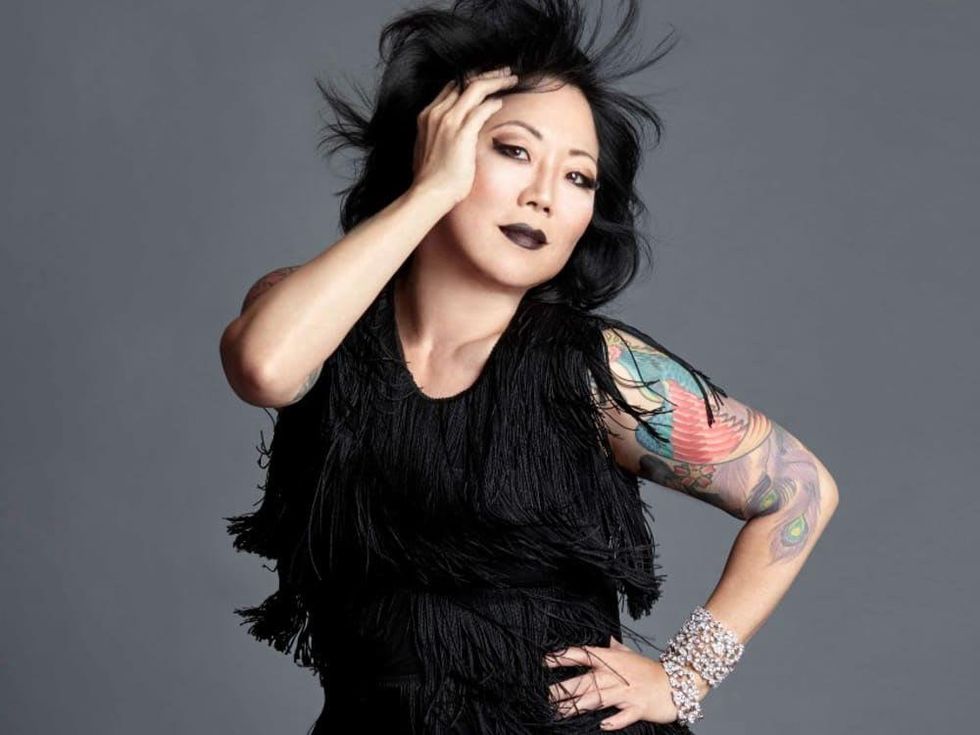
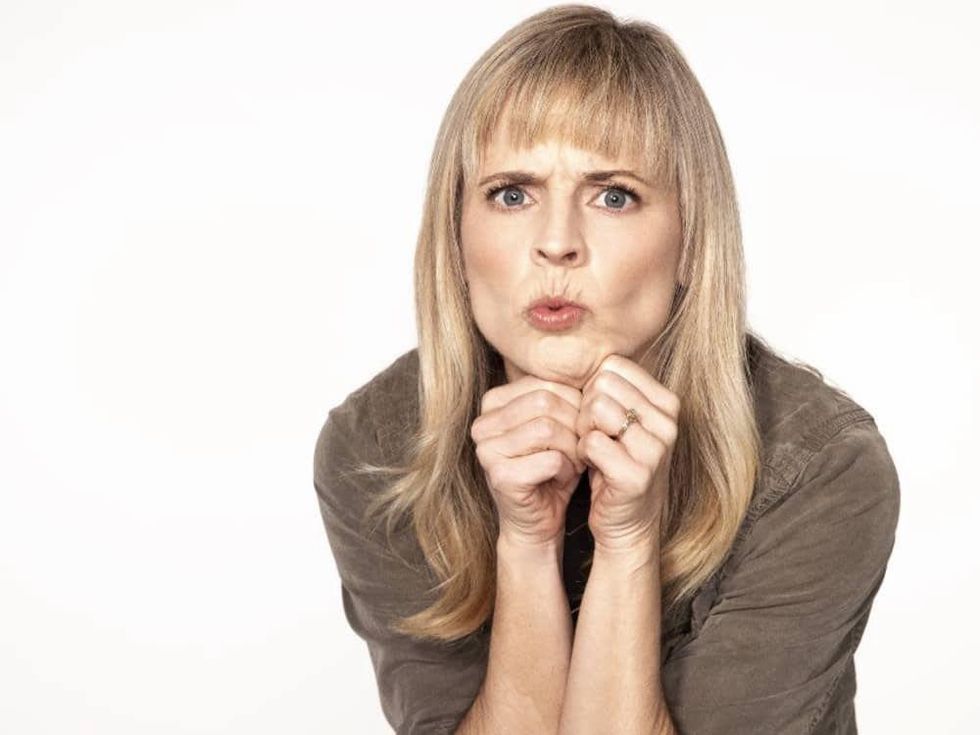
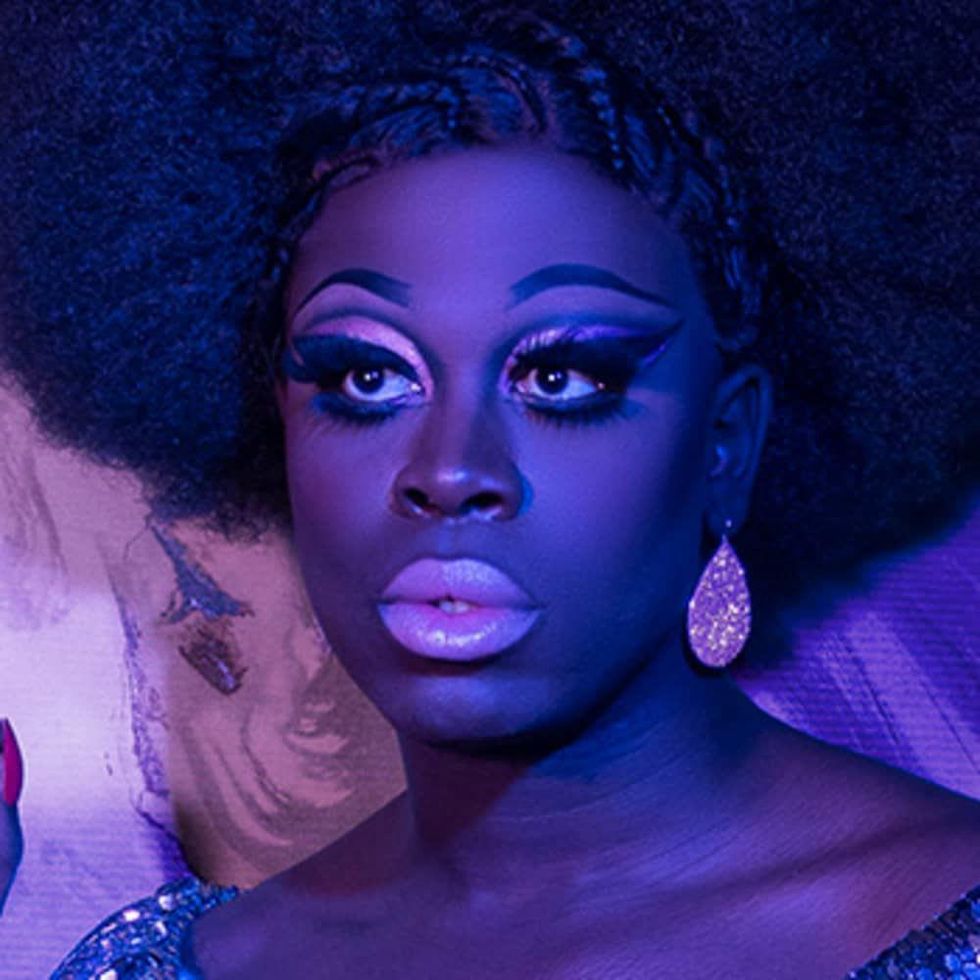
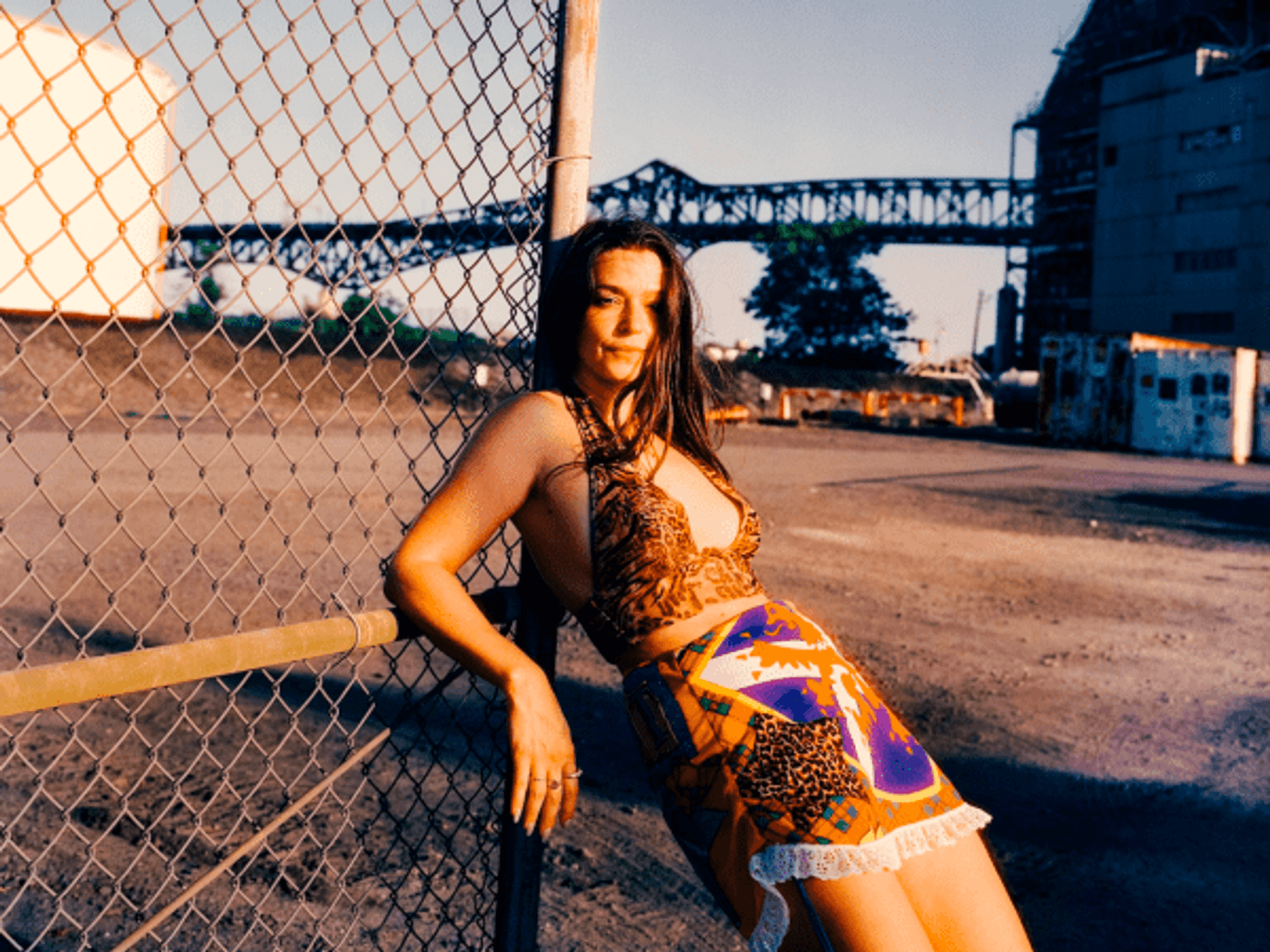
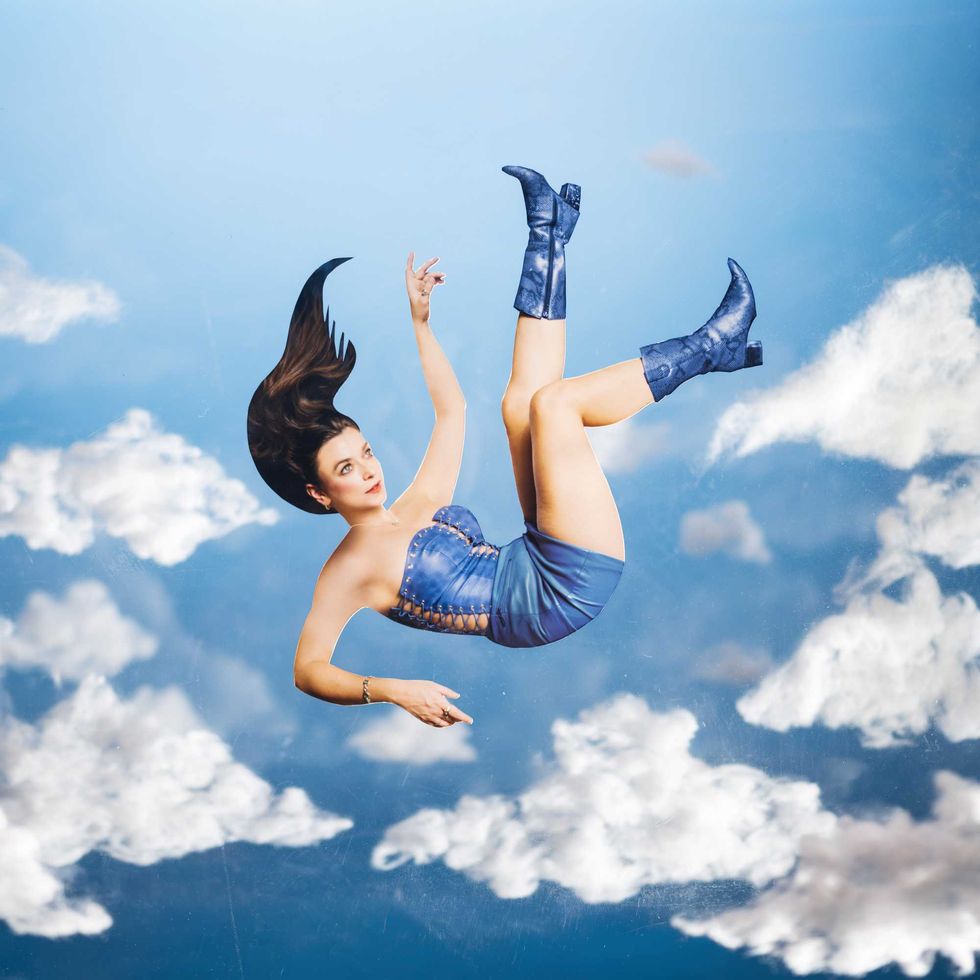 This album cover was collaged in real life and shot in floating layers, a video shared on social media revealed.Album cover of Annabelle Chairlegs
This album cover was collaged in real life and shot in floating layers, a video shared on social media revealed.Album cover of Annabelle Chairlegs